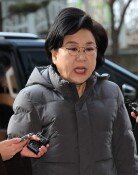Lawmaker Warns Against Abuse of Budget Increase
Lawmaker Warns Against Abuse of Budget Increase
Posted October. 30, 2008 09:19,
The National Assembly will review next years budget from next month, and likely grant President Lee Myung-baks request to expand the budget.
Pundits warn, however, that an expanded budget could result in a massive deficit, questioning how it can effectively and appropriately be used to boost the sagging economy. They say constituencies may continue to squander the governments money for pompous and glossy projects next year.
Lee Hahn-koo, chairman of the National Assembly`s Special Committee on Budget and Accounts, also expressed such fears in an interview with The Dong-A Ilbo, excerpts from which follow.
Q: What is your forecast for the increase in nexts year budget? (The governments initial proposal was 209 trillion won, or 147.2 billion U.S. dollars, based on the general account.)
A: I expect an increase of about five trillion won (3.2 billion dollars). A budget deficit of 10 trillion won (seven billion dollars) is also likely due to additional tax breaks of two trillion to three trillion won and the decrease in tax revenues of three trillion won in the face of the economic slowdown. In this case, the amount of fiscal deficit for 2009 will exceed 20 trillion won (14.1 billion dollars).
Q: What should we watch out for in the process of budget deliberation?
A: The government plans to spend the supplementary budget in creating jobs or social overhead capital projects. But no matter how urgent the situation may be, injecting tons of money into less important projects without thoroughly reviewing feasibility, efficiency and productivity will not help stimulate the economy. It will only result in wasting the governments money.
Q: Wont lawmakers demand a budget increase for their constituencies?
A: Politicians will find this year a golden opportunity to get a piece of the budget pie because of the general consensus that the government should loosen its budget to fight off recession. The government, however, should not allocate money to projects not on the priority list of its initial budget proposal.
Q: How can we prevent inappropriate budget allocation?
A: The president and the government must avoid the temptation to launch white elephant projects. Lawmakers should be willing to risk personal loss. Thorough monitoring by the media and professional groups is also necessary.
Q: What can the National Assembly do for this?
A: A freeze should be put not only the wages of government employees, but also spending by lawmakers. The National Assembly should also tighten its purse strings.
Q: What are the prospects for tax revenues?
A: The government plans additional tax cuts to ease the tax burden on workers, but the question is if giving them a few hundred dollars a year will boost consumption.
Q: What is your opinion on the presidents plan to increase government spending at the beginning of the economic crisis?
A: If the crisis was expected to end in the near future, he would be right. No one knows, however, what will happen in the future. In the beginning of the (1997) foreign currency crisis, we did not expect financial companies to collapse. So we might just have begun a marathon. If we run at full speed from the start, we might be unable to complete the race, which could take a few more years. Thus, it is important to persuade the people to endure as much as possible rather than throwing away money at the onset of the crisis. At the same time, the government should revitalize the private sector through deregulation, while reforming the public sector.
koh@donga.com srkim@donga.com







